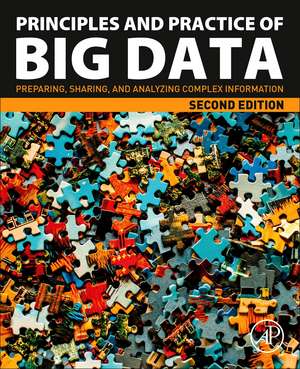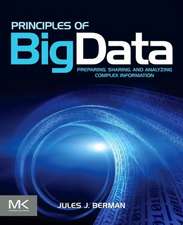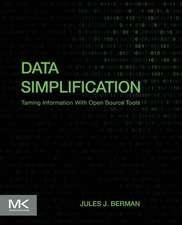Principles and Practice of Big Data: Preparing, Sharing, and Analyzing Complex Information
Autor Jules J. Bermanen Limba Engleză Paperback – 24 iul 2018
Through the use of new multiple examples, this edition demonstrates that if we understand our data, and if we know how to ask the right questions, we can learn a great deal from large and complex data collections. The book will assist students and professionals from all scientific backgrounds who are interested in stepping outside the traditional boundaries of their chosen academic disciplines.
- Presents new methodologies that are widely applicable to just about any project involving large and complex datasets
- Offers readers informative new case studies across a range scientific and engineering disciplines
- Provides insights into semantics, identification, de-identification, vulnerabilities and regulatory/legal issues
- Utilizes a combination of pseudocode and very short snippets of Python code to show readers how they may develop their own projects without downloading or learning new software
Preț: 354.72 lei
Preț vechi: 511.82 lei
-31% Nou
67.88€ • 70.03$ • 57.45£
Carte tipărită la comandă
Livrare economică 25 februarie-11 martie
Livrare express 25-31 ianuarie pentru 99.59 lei
Specificații
ISBN-10: 0128156090
Pagini: 480
Dimensiuni: 191 x 235 x 26 mm
Greutate: 0.82 kg
Ediția:2
Editura: ELSEVIER SCIENCE
Cuprins
1. Introduction 2. Providing Structure to Unstructured Data 3. Identification, Deidentification, and Reidentification 4. Metadata, Semantics, and Triples 5. Classifications and Ontologies 6. Introspection 7. Data Integration and Software Interoperability 8. Immutability and Immortality 9. Assessing the Adequacy of a Big Data Resource 10. Measurement 11. Indispensable Tips for Fast and Simple Big Data Analysis 12. Finding the Clues in Large Collections of Data 13. Using Random Numbers to Bring Your Big Data Analytic Problems Down to Size 14. Special Considerations in Big Data Analysis 15. Big Data Failures and How to Avoid (Some of) Them 16. Legalities 17. Data Sharing 18. Data Reanalysis: Much More Important than Analysis 19. Repurposing Big Data
Descriere
Principles and Practice of Big Data: Preparing, Sharing, and Analyzing Complex Information, Second Edition updates and expands on the first edition, bringing a set of techniques and algorithms that are tailored to Big Data projects. The book stresses the point that most data analyses conducted on large, complex data sets can be achieved without the use of specialized suites of software (e.g., Hadoop), and without expensive hardware (e.g., supercomputers). The core of every algorithm described in the book can be implemented in a few lines of code using just about any popular programming language (Python snippets are provided).
Through the use of new multiple examples, this edition demonstrates that if we understand our data, and if we know how to ask the right questions, we can learn a great deal from large and complex data collections. The book will assist students and professionals from all scientific backgrounds who are interested in stepping outside the traditional boundaries of their chosen academic disciplines.
- Presents new methodologies that are widely applicable to just about any project involving large and complex datasets
- Offers readers informative new case studies across a range scientific and engineering disciplines
- Provides insights into semantics, identification, de-identification, vulnerabilities and regulatory/legal issues
- Utilizes a combination of pseudocode and very short snippets of Python code to show readers how they may develop their own projects without downloading or learning new software

























